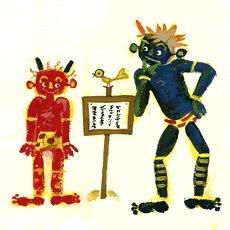The timing of the rally was perfect, designed to coincide with -- and scuttle -- the Abuja peace negotiations between the rebels and Khartoum brokered by the African Union, whose deadline is midnight today. And sure enough, the rebels rejected the AU peace deal:
The rebels called for changes to the deal hours before an African Union deadline -- and after the Sudanese government indicated it would accept the proposal. . . . The Sudanese government had said it was ready to sign the agreement. But a spokesman for one of Sudan's rebel factions said the proposal does not adequately address implementation nor their key demands for a vice president from Darfur and more autonomy. Hahmed Hussein, a spokesman for the Justice and Equality Movement, said he was speaking for both rebel factions. (Associated Press, "Rebels Reject Draft Darfur Peace Deal," New York Times 30 April 2006)Really, why should the rebels accept it, when Washington, given an excuse by the pro-war rally organized by an alliance of evangelicals and establishment Jews, is pushing for NATO interventions just at this moment? "U.S. Secretary of State Condoleezza Rice said on Thursday that the African Union (AU) peacekeeping mission in Sudan's Darfur region was not strong enough and that NATO should take on a larger role there" (Reuters, "Rice urges Expanded NATO Role in Darfur," 30 April 2006). The rebels would naturally think: "Why don't we wait till Washington sends us NATO or UN or US troops to weaken the government's hands, so we can get a better deal?"
Remember how the specter of an international military intervention prolonged the civil war in Yugoslavia: "It also appears to be true the United States encouraged Izetbegovic to reject the EC-sponsored cantonization plan agreed upon in two separate meetings in late winter 1992," as General Charles G. Boyd puts it cautiously, "Making Peace with the Guilty: The Truth about Bosnia," Foreign Affiars September/October 1995)? It's the same dynamics . . . except the prize is more valuable than territories: "Sudan has proven reserves of some 563 million barrels of oil, with the potential for far more in regions of the country made inaccessible by conflict" (Esther Pan, "China, Africa, and Oil," Council on Foreign Relations, 12 January 2006).
Putting an end to the Darfur conflict now would consolidate Beijing's dominant position in Sudan's oil industry:
China has a $4 billion investment in the country widely believed to have the largest untapped oil reserves in Africa. The China National Petroleum Corp. has a 40% stake in Greater Nile Petroleum, which owns oil fields, a pipeline, a large refinery and a port. Last year, China purchased more than half of Sudan's oil exports. Conversely, Sudan accounted for 6% of China's oil imports, about 200,000-plus barrels a day. (Jon D. Markman, "How China Is Winning the Oil Race," MSN Money, 25 April 2006)Who wants peace in Darfur? Certainly not Washington.
UPDATE
I revised this entry, retitled it "Who Wants Peace in Darfur?" and published it in MRZine.





